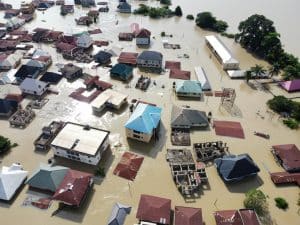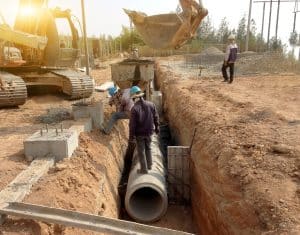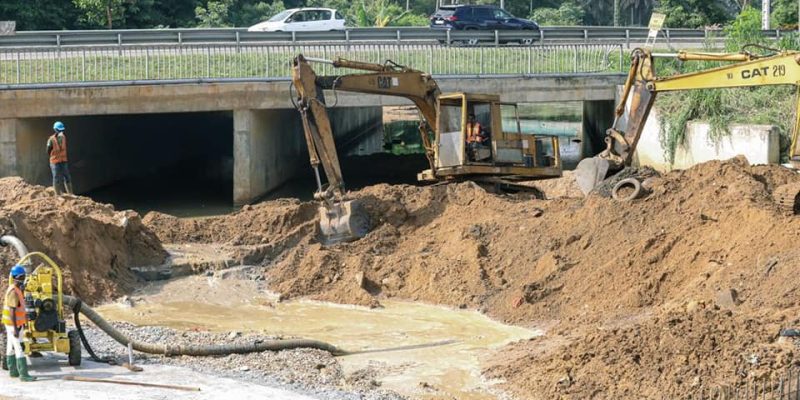Flooding is a frequent occurrence during the rainy season in Benin, Burkina Faso, Mali, Niger, Senegal, Togo, Guinea-Bissau and Ivory Coast. The attractiveness of these towns and cities, and the livelihoods of their populations, suffer as a result. Faced with these extreme meteorological phenomena, which highlight the poor preparedness of civil protection services and the inadequate adaptation of public policies to the urban occupation of at-risk areas, the West African Development Bank (BOAD) has been involved for fifty years in financing infrastructure, particularly flood management infrastructure. The aim is to limit the economic and environmental damage caused by natural disasters exacerbated by climate change. This support is fully in line with the recommendations of experts at a time when Africa Climate Week (ACW) is being held in Nairobi from 4 to 8 September 2023.
[PARTNER ARTICLE] Abidjan and Yamoussoukro inIvory Coast, Lomé in Togo, Bafatá in Guinea-Bissau. These major West African cities, most of them coastal and port towns, are not spared from flooding. Every year, local populations are forced to move when they are not themselves the victims of these cyclical phenomena, which jeopardise biodiversity and consequently their livelihoods. In August 2022, for example, many schools and homes in Saint-Louis, Senegal, were submerged by water, particularly in the districts of Pikine Guinaw Ray, Sor Diagne, Tableau Walo, Diaminar, Darou and Médina Courses.
An economic disaster
This is a situation that worries the World Food Programme (WFP), especially as the phenomenon is decimating the livelihoods of people who depend mainly on agriculture. According to the UN agency, 43 million people in sub-Saharan Africa, the majority of them in West African countries, are exposed to food insecurity as a result of flooding.
In Benin, torrential rains in recent years have caused spectacular flooding in 55 of the country’s 77 councils, resulting in the deaths of 46 people and, in the process, “680,000 tonnes of agricultural produce and 201,600 hectares of crops have been destroyed, as have 81,000 head of livestock, not to mention the destruction of 455 schools and 92 health centres”, laments Komitse Edoh Agbo, Civil Engineering Engineer with the West African Development Bank (BOAD).

Houses under water ©Chinedu Chime/ Shutterstock
The infrastructure response
Faced with this phenomenon, which is partly due to the geographical position of certain towns in the region in relation to sea level, and whose management remains limited by the inadequacy and obsolescence of existing sewerage networks, the sub-regional institution, which operates in Benin, Burkina Faso, Ivory Coast, Guinea-Bissau, Mali, Niger, Senegal and Togo, has activated its DJOLIBA 2021-2025 Strategic Plan, focusing in particular on climate resilience. For example, the BOAD is financing the construction and rehabilitation of rainwater drainage infrastructure, notably as part of the project to reinforce the Ouagadougou rainwater drainage network in Burkina Faso. “Our work involves recalibrating and developing the Kadiogo marigot, which is the main watercourse in the urban catchment area of the capital of Burkina Faso. These improvements will later lead to the construction of a fourth rainwater retention dam in the city”, explains Komitse Edoh Agbo.
The projects financed by the Bank also include the development and integrated management of the Gourou catchment area in Abidjan, Ivory Coast. The work will limit the economic and ecological impact of flooding in the councils of Abobo, Adjamé, Cocody and Plateau. As far as the city of Lomé in Togo is concerned, “work has been done in the past to develop the lagoon area and restore the rainwater retention capacity of the Bè lagoon”, explains the Doctor of Engineering Sciences, who reassures us that the construction of other drainage works such as collectors is under way in Kaolack and Diamniadio in Senegal, and even in Bissau in Guinea-Bissau.
While it is clear that its allocations are shared fairly between West African Economic and Monetary Union (UEMOA) member countries, the financial institution also takes account of funding priorities and emergencies. This is where the Rainwater Sanitation Programme for Secondary Cities (PAPVS) in Benin comes into its own.
This programme, worth 280 billion CFA francs, involves several donors, including BOAD, which has already provided 20 billion CFA francs of funding for rainwater drainage in the town of Parakou, and is in the process of arranging funding for work in the town of Natitingou. The other towns (Abomey, Bohicon, Calavi, Ouidah, Sèmè-Kpodji and Porto-Novo) are being financed by the African Development Bank (AfDB) and the European Investment Bank (EIB). Ultimately, Benin’s PAPVS, steered by the Société des Infrastructures Routières et de l’Aménagement du Territoire (SIRAT), should improve the living conditions of many city dwellers.

Building resilience infrastructures ©Sakoat Contributor/Shutterstock
A future resilient to climate change in urban areas
In any case, this is what Komitse Edoh Agbo and the BOAD teams want. “The retrospective evaluations of the Bank’s interventions are giving encouraging feedback from the populations targeted by the installations. For example, in the city of Ouagadougou, particularly in the area of the Kadiogo marigot, we have received several positive testimonies regarding the improvements brought about by the sanitation projects, as well as the urban roads. It should be noted that all road asphalting work financed by BOAD is systematically coupled with rainwater drainage to ensure the durability of the road and prevent or eradicate flooding. Many neighbourhoods that were abandoned every rainy season because of flooding are once again habitable and accessible”.
As well as funding infrastructure, the time has also come to build the capacity of local players, particularly municipalities. In this area, BOAD’s technical and financial support is aimed at “ensuring that the works, once completed, can be properly maintained”, says the institution headed by Serge Ekué. To this end, the main towns in the BOAD have already benefited from waste management awareness campaigns and activities to strengthen the solid waste management sector.
“In Ouagadougou, for example, we are currently helping the municipality to acquire 1,000 dustbins, five refuse bins and two tippers. We are also training municipal technical services staff in rainwater-related issues, as well as providing them with rolling stock and IT equipment,” explains Komitse Edoh Agbo. According to him, this technical support from BOAD should help to ensure that the pipes and other rainwater retention structures function properly. This is the case with the Gourou basin in Abidjan, where the launch of a pilot training unit for local players in the recovery of solid urban waste is already in sight”.
Benoit-Ivan Wansi








You must be logged in to post a comment.